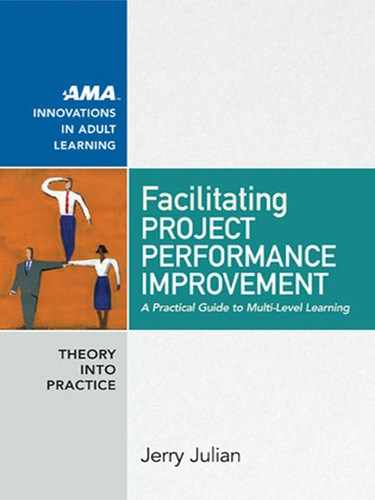74 American Management Association
www.amanet.org
In the previous chapter, we discussed the role of the multi- level learning
coach. In this chapter, we discuss the role of the project or program man-
agement function, sometimes called a PMO (for project or program man-
agement o ce), but alternatively called a product development group,
business transformation group, project services organization, client ser-
vices group, or center of excellence (Dai, 2002; Engle, 2005; Kerzner, 2006;
Rad & Levin, 2002). While a PMO is not required in order to deploy multi-
level learning, the functions provided by a PMO can build learning prac-
tices into the way work gets done and transfer the resulting improvements
from one team to the next.
Victoria Marsick and Karen Watkins (1999) explain that continuous
systems- level learning is required if organizations are to improve and
transform to achieve higher levels of performance. Their view is based
on the work of Chris Argyris and Donald Schön (1996), who view organi-
zational learning as occurring if two criteria are satis ed: (1) individuals,
either appointed by management or anointed by followers, “take their
learning back to the system,” and (2) the system has “structures, pro-
cesses and a culture in place to embed and support organizational learn-
ing” (Marsick & Watkins, 1999, p. 12). Whether they are performed by
a PMO or by some other group, the functions of a PMO are important
because, as discussed in the previous chapter, people in project environ-
ments are continually rotating into and out of roles. When project teams
disband upon completion of their work, this often means that “the end
of a project is consequently the end of collective learning” (Schindler &
4 THE PROJECT AND
PROGRAM MANAGEMENT
FUNCTION (PMO)
The Project and Program Management Function (PMO) 75
American Management Association
www.amanet.org
Eppler, 2003). As George Disterer (2002) explains, there is often no “for-
mal corpus” left where existing knowledge can be accessed once projects
are over. Because of its temporary nature, project work by itself does not
provide the structures necessary to ensure that learning is captured and
applied by the organization to improve future project performance (Ek-
stedt, 1999). Without a knowledge broker or some form of PMO func-
tion serving in this capacity, the organization risks losing the knowledge
gained by project teams, resulting in redundant work, repetition of mis-
takes, and considerably higher costs on future projects (Schindler & Ep-
pler, 2003). E ective PMOs are able to “take learning back to the system”
and embed the resulting knowledge into the way the organization func-
tions on an ongoing basis. Continuous systems- level learning provides
the mechanisms for building learning, knowledge, and adaptation into
systems and routines that go beyond the tenure of speci c individuals
working in the project environment at any one time.
This chapter discusses how leaders of PMOs help their organizations
continuously improve their performance from one project and program
to the next. The chapter draws on a study of 20 PMO leaders and 6 project
managers (Julian, 2008c) from a variety of functional disciplines, includ-
ing IT (representing the majority, with 65 percent), product development,
strategy, nance, and HR, to provide examples of how PMO leaders have
helped their organizations build on success and avoid repetition of failure
by brokering practice connections across groups and by establishing or-
ganizational routines that transfer learning from one project to the next.
As we shall also see, however, PMO leaders face a number of obstacles to
helping their organizations learn and improve. Many of these obstacles
are self- created—and many of them exist because the leaders are stuck in
the middle, between trying to manage performance, on the one hand, and
serve as facilitators of learning, on the other. We end the chapter with a
discussion of how PMOs or similarly structured groups can become more
e ective brokers of organizational learning and continuous improvement,
including how they might work with the multi- level learning coach to
overcome many of the obstacles they face.
..................Content has been hidden....................
You can't read the all page of ebook, please click here login for view all page.
